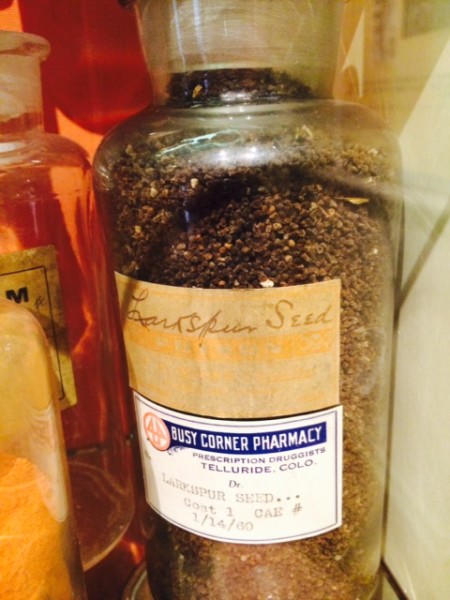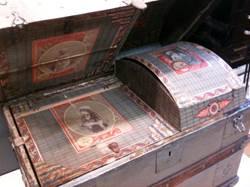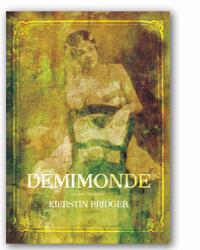
05 Mar MIXX: An Evening with “Demimonde”
Readings from “Demimonde,” book-signing, and talk featuring author/poet Kierstin Bridger, hosted by Pia Gedeon, owner, MIXX Projects + Atelier. Free gathering is Thursday, March 10, 7 – 9 p.m., 307 East Colorado Avenue. “Demimonde” is available at Telluride’s Between the Covers bookstore. Please RSVP to Pia @ gedeon@mixxprojects.com.

Ever combed through old photographs and newspapers at the Telluride Historical Museum? If you did, you might find old crime reports, which often served as advertisements for the “sporting houses” and women of the saloons – as author/poet (and regular contributor to Telluride Inside… and Out) Kierstin Bridger did.
Before getting hooked on the subject of Telluride’s, well, hookers.
“I also visited local museums to see the perfume bottles and glassware, the photographs of the landscape…Telluride did not have this many aspens back in 1899! I also read books like, ‘Soiled Doves’;’ ‘Prostitution In the Early West’ by Anne Seagraves;’Feisty Females of The Wild West’ by Michael Rutter; ‘Madam Millie’ by Max Evans; ‘Six Racy Madams of Colorado’ by Caroline Bancroft; ‘Brides of the Multitude – Prostitution in the Old West’ by Jeremy Agnew; ‘The Lost SisterHood’ by Ruth Rose; and ‘Daughters of Joy, Sisters of Misery: Prostitutes in the American West,’ 1865-90 by Anne M. Butler. I watched a lot of old movies too. Mae West To ‘Pretty Baby’ and ‘Calamity Jane.’ Mostly I did some deep imagining of what it would be like to live without many choices, education or opportunity in a brutal and beautiful landscape such as ours. I hike a lot and see the traces of mines and shacks, and an era run on greed and railways, the hierarchy of need and want. All it takes is a rustle of aspen and my imagination spins back to another time.”
That “spinning” led to a spinning of a web of dark alleys and dastardly deeds, dead babies, dead dogs, dead souls, all players in a collection of poems bound together in a newly released book, “Demimonde.”
Kierstin’s dramatic, edgy, heart-breaking, heart-warming verse bring back to life the women who worked in the red light district in a turn-of-the-century mining town, the world of Telluride’s sultry, sinful past.“Demimonde” literally refers to the “half-world,” the liminal space, those women occupied. Like them, Kierstin’s words dance nimbly on the razor’s edge.
Meet Thursday, March 10, 7 – 9 p.m. at MIXX Projects + Atelier for a special evening that includes readings from “Demimonde,” a book-signing, and discussion with Kierstin Bridger.
The nascent project that became “Demimonde” began to coalesce when Kierstin gave a Museum Art from The Archives Talk on “Girls On The Line: When Contemporary Poetics meet Telluride’s Turn of the Century Red Light District.”
Further research was required to find out what how the pharmaceuticals in the museum displays were used.
“Apparently Larkspur is great for getting rid of lice and crabs.”

Kierstin sent the many, many photographs she found online to her editor, Kyle Harvey of Lithic Press.
“I wanted very specific historical images to go with each poem. We couldn’t always get the rights or a large enough image for the book, so Kyle found some amazing swap-outs. It was such a great collaboration!”
This past April, Telluride local Scott Kennett donated a Victorian domed-topped Saratoga Trunk to the museum.
Collected from a Telluride bordello by the Albin family, the trunk has been well cared for with a beautifully preserved interior. Its original compartments and lining are still intact complete with lithographic images of Victorian women on the inside dome lid. The “Saratoga Trunk,” originally named so for ladies needing large trunks to hold lots of clothing, hats, etc. for extended trips to the popular resort of Saratoga Springs, NY, is luxury accessory.
Handcrafted around 1882-1885, the trunk was commissioned for a lady who most likely traveled frequently and for long periods of time. Since its final resting place was at a bordello in Telluride’s red light district, it is possible the trunk belonged to a madam or popular lady on the line who would have needed the trunk to store her belongings.
The trunk will be displayed in the Museum’s Home and Leisure Room this summer helping to complete the room’s “Popcorn Alley” theme.

In response to the illustrious accessory, Kierstin wrote the following poem, originally published in the Telluride Watch:
Baby Names
Muddy, slanted floors, rooms of narrow snears,
the one bent wood rocker in the corner,
light filtered through stained glass—
nothing pastoral or Magdalene, only
bright and pointed harlequin squares.
Gone are the soiled doves,
exchanging favors for the wages
of silver mines, rattled tales
and hymns, infantile endearments,
Dolly, Lamb, Lil Pistol, Sunshine.
Found in the bordello’s attic:
pasted portraits in sepia, shape of a cradle,
a painted oak steamer trunk
storing infant gowns,
too far-gone to ever christen a child.
I think of the long stares, snowcaps
beyond the flies and their prism wings
which beat against the slipped and warbled glass.
Forgotten women whose whiskey hours drown
in kerosene –lit cribs lining this mining town.
That poem is one of many that pierce the soul from “Demimonde,” published in February 2016.

“Kierstin Bridger amazes me with the pure energy that she is able to bring to everything in her life, including poetry. Seamus Heaney called poetry psychic fossil fuel, and Kierstin works that mine, pickaxing coal, finding diamonds. Demimonde is a collection about the dimly–lit world of women who sold their attention and bodies to survive the nineteenth century in the West. What sets Bridger apart as a poet in a densely populated literary world is not only her robust narrative, coupled with growing wisdom, but the way she is able to build, in a manner that often seems effortless, startling and unique clusters of language. I don’t know another poet writing today who is able to fashion language into such radiant new symmetries. I look forward to watching her comet trail blaze forth into the world of poetry,” Sandra Alcosser, poet “Except by Nature” and “A Fish to Feed All Hunger”
“This is an amazing collection of poems, spoken in the first-person voices of girls and young women who worked in the mining town “sporting houses” of Telluride around the turn of the last century. Kierstin Bridger’s vivid, unsparing language captures the desperation, tedium and pathos of the day-to-day lives of these women in words and images that burn indelibly into the mind and sear the reader’s soul like a branding iron. She has the poet’s unerring eye for the minute, telling details that reveal not only the physical experiences of these women, but their acute, matter-of-fact perception of those experiences and their hopeless acceptance of the inescapable lives that encompass them. Ms. Bridger so fully and intimately inhabits these women, her poems are not about them, they are of them and from them,” Jack Watson, White House Chief of Staff, Carter Administration.
“The history of the West has a submerged narrative. Beneath the story of conquest and destiny are stories of despair, desire, abuse and loss— women’s stories that are finally given lyric voice in Demimonde. ‘This is the land/ where ladders fall away,’ where hope and aspiration are used up, where lives are bought and sold. These are stories of ‘our other selves/ selves we’d want saved.’ With language that is sonorous, rich and compassionate, Bridger imagines these women back to life, and when we see them lifted out of their oppression, we understand our history in a new way, not storied by men but storied and sung by women, unmuffled, fierce, courageous and compassionate, finally liberated in a burst of gorgeous and sorrowful poetry,” Lisa Allen Ortiz, Author of “Turns Out” and “Self Portrait As a Clock.”


Sorry, the comment form is closed at this time.